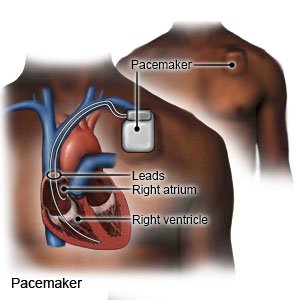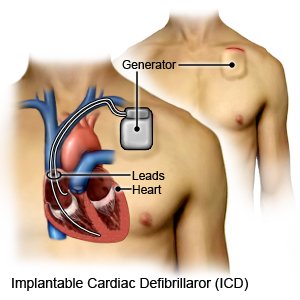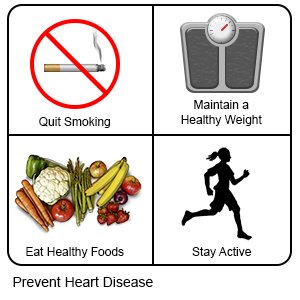Restrictive Cardiomyopathy
Medically reviewed by Drugs.com. Last updated on Sep 23, 2025.
What is restrictive cardiomyopathy (RCM)?
RCM is a disease of your heart muscle. RCM occurs when the lower chambers of your heart (ventricles) become stiff or weak. Ventricles pump blood to your lungs and the rest of your body. When the ventricles are stiff or weak, your heart cannot fill with enough blood. This decreases the blood and oxygen supply to the rest of your body.
 |
What increases my risk for RCM?
- A family history of RCM
- Conditions such as cancer or diabetes, or a genetic disease that causes RCM
- Radiation treatment
What causes RCM?
RCM is often caused by another disease. The disease can occur in your heart muscle or another organ and can lead to heart damage. Ask for more information about diseases that may lead to RCM. Causes for RCM may include any of the following:
- Infiltrative and storage diseases cause substances such as minerals, proteins, lumps of cells, and fat to collect in your heart muscle. These diseases include amyloidosis, Gaucher disease, Fabry disease, and sarcoidosis. The buildup of substances causes your ventricles to become stiff or weak.
- Endomyocardial diseases cause scarring and thickening of your heart muscle. These diseases include diabetes and scleroderma. Some cancers, chemotherapy, or radiation treatment can also cause your ventricles to thicken from scarring.
What are the signs and symptoms of RCM?
- Chest pain or trouble breathing
- Feeling dizzy or faint when you stand up quickly or exercise
- Fatigue (being mentally and physically tired) and weakness
- Nausea and loss of appetite
- Weight gain and swelling in your legs, ankles, feet, and abdomen
- Feeling like your heart is beating fast, fluttering, or jumping in your chest
- Swollen or bulging neck veins
How is RCM diagnosed?
Your healthcare provider will listen to your heart and lungs. Your provider may check your abdomen, ankles, and feet for swelling. Tell your provider if you have other health conditions or family members with heart disease. Tell your provider if you smoke, drink alcohol, or take drugs. You may need the following tests:
- Blood and urine tests may be used to help find the cause of your RCM. These tests may also show if your organs, such as your liver and kidneys, are working correctly.
- An EKG records the electrical activity of your heart. It may show abnormal heartbeats or signals from changes to the heart muscle.
- An echocardiogram is a type of ultrasound. Sound waves are used to show the structure and function of your heart.
- X-ray, CT, or MRI pictures will show the size of your heart and ventricles. These tests can also check if you have fluid or buildup around your heart or lungs. You may be given contrast liquid to help healthcare providers see the pictures better. Tell the healthcare provider if you have ever had an allergic reaction to contrast liquid. Do not enter the MRI room with anything metal. The MRI machine uses a powerful magnet. Metal can cause serious injury from the magnet. Tell the healthcare provider if you have any metal in or on your body.
- Cardiac catheterization is a procedure used to look for or treat a heart condition. A catheter is inserted in your arm, neck, or groin and moved into your heart. Contrast liquid is injected into an artery and x-rays of your blood flow are taken. Tell a healthcare provider if you have ever had an allergic reaction to contrast liquid.
- A tissue biopsy is a procedure to remove a small tissue sample from your heart or other parts of your body. The sample will be tested and show if scar tissue is the cause of your RCM.
How is RCM treated?
RCM cannot be cured. The goal of treatment is to manage your symptoms and improve your quality of life. You may need any of the following:
- Medicines may be given to lower your blood pressure and help control your heartbeat. You may need medicine to help prevent blood clots. You may also need medicine to decrease fluid buildup in your body.
- A pacemaker is a device that helps your heart beat at a regular rate and rhythm. The pacemaker monitors your heart rhythm. If your heart does not beat as it should, the pacemaker sends small electric signals to your heart.

- An implanted cardioverter defibrillator (ICD) is a small device that monitors your heart rate and rhythm. If your ICD senses that your heart is not beating correctly, it will give it a small electrical shock. This helps your heart to beat regularly again.

- A left ventricle assist device (LVAD) is a device placed inside your left ventricle to help your heart pump better. You may need an LVAD while you are waiting for a heart transplant.
- Surgery may be needed to repair or replace a heart valve. You may need a heart transplant if your heart is severely damaged. During a heart transplant, your damaged heart is removed and replaced with a healthy heart from a donor.
How can I manage my symptoms?
- Check your weight daily. Weight gain can be a sign of extra fluid in your body. Weigh yourself at the same time every morning. Use the same scale and weigh yourself before you eat and after you urinate. Record your weight and the time you weighed yourself in a diary. Bring your diary to your visits with your healthcare provider.
- Limit your liquids. Your risk for fluid buildup and swelling increases if you drink too much liquid. Ask how much liquid to drink each day and which liquids are best for you.
- Manage your health conditions. Health conditions, such as diabetes and high blood pressure, may make your symptoms worse and increase your risk for other heart problems.
- Be physically active, as directed. Physical activity, such as exercise, may help decrease your symptoms and improve your heart function. Ask your provider about the best activity plan for you.
- Eat a variety of healthy foods. Healthy foods include fruits, vegetables, whole-grain breads, low-fat dairy products, beans, lean meats, and fish. Limit the amount of sodium (salt) you eat. Too much sodium can cause swelling and make your symptoms worse. Ask how much sodium you can have each day. Pay attention to sodium content on food labels.

- Do not drink alcohol, smoke, or use drugs. Alcohol, tobacco smoking, or illegal drugs can make your heart condition worse. Ask for information if you need help quitting.
 |
Call your local emergency number (911 in the US) if:
- You have chest pain that gets worse when you take a deep breath or cough. You cough up blood.
- You have a sudden cold sweat and chest discomfort, or trouble breathing.
- You have pain or discomfort in your back, neck, jaw, abdomen, or 1 or both arms.
- You have dizziness, severe headache, or vision loss.
- You have weakness in your arm or leg.
- You are confused or have difficulty speaking.
When should I seek immediate care?
- Your heart is beating faster than usual, fluttering, or jumping in your chest.
- You urinate less than usual or not at all.
- You are tired and cannot think clearly.
- You have increased swelling in your legs, ankles, feet, or abdomen.
When should I call my doctor?
- You feel weak or more tired than usual.
- You have trouble taking your medicine.
- You have questions or concerns about your condition or care.
Care Agreement
You have the right to help plan your care. Learn about your health condition and how it may be treated. Discuss treatment options with your healthcare providers to decide what care you want to receive. You always have the right to refuse treatment. The above information is an educational aid only. It is not intended as medical advice for individual conditions or treatments. Talk to your doctor, nurse or pharmacist before following any medical regimen to see if it is safe and effective for you.© Copyright Merative 2025 Information is for End User's use only and may not be sold, redistributed or otherwise used for commercial purposes.
Learn more about Restrictive Cardiomyopathy
Treatment options
- Medications for Alcoholic Cardiomyopathy
- Medications for Cardiomyopathy
- Medications for Restrictive Cardiomyopathy
Care guides
Symptoms and treatments
Further information
Always consult your healthcare provider to ensure the information displayed on this page applies to your personal circumstances.
